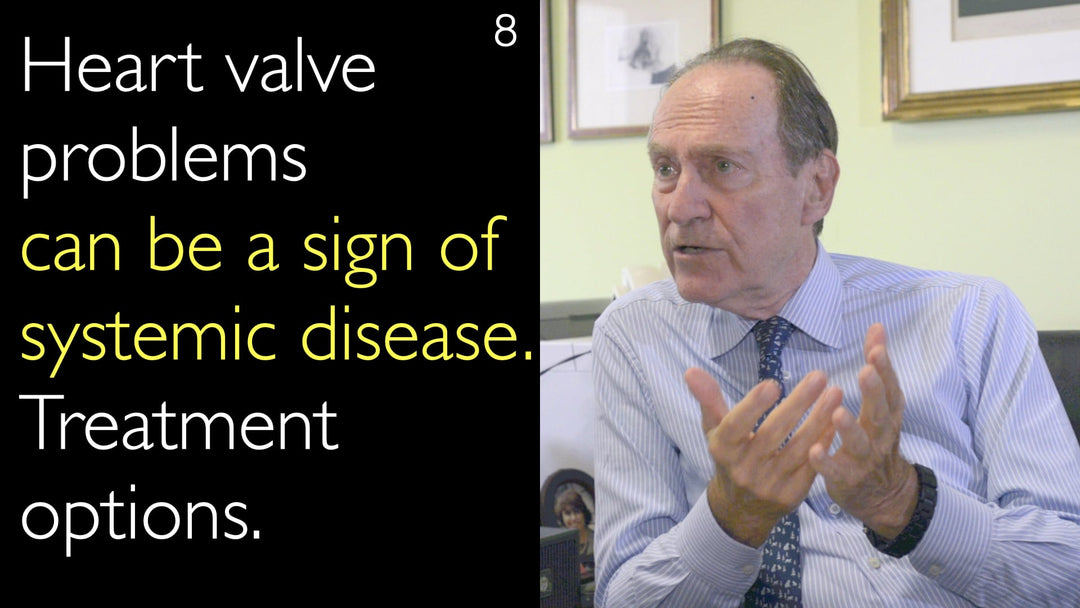Leading expert in heart valve surgery, Dr. Ottavio Alfieri, MD, discusses how heart valve problems can indicate systemic diseases. He emphasizes the importance of early diagnosis and collaboration among specialists. Dr. Ottavio Alfieri, MD highlights systemic diseases like Marfan syndrome, systemic lupus erythematosus, and rheumatoid arthritis that can manifest as heart valve issues. He advises that cardiac surgeons and cardiologists should be vigilant and proactive in treating heart valve diseases caused by systemic conditions to prevent irreversible damage.
Heart Valve Disorders as Indicators of Systemic Diseases
Jump To Section
- Systemic Diseases Affecting Heart Valves
- Impact of Oncologic Treatments on Valve Function
- Genetic Disorders and Heart Valve Disease
- Autoimmune Conditions and Valve Health
- Surgical Approach to Systemic Valve Disease
- Full Transcript
Systemic Diseases Affecting Heart Valves
Dr. Ottavio Alfieri, MD, explains that heart valve problems can often be a sign of underlying systemic diseases. Conditions such as Marfan syndrome, systemic lupus erythematosus, and rheumatoid arthritis are known to affect heart valves. Early diagnosis of these systemic diseases is crucial, as it can help in managing heart valve issues more effectively.
Impact of Oncologic Treatments on Valve Function
Dr. Ottavio Alfieri, MD notes that oncologic treatments, including radiation and certain medications, can adversely affect heart valve function. Post-radiotherapy valvular problems are increasingly common, necessitating awareness among healthcare providers. Monitoring and managing these effects are essential to prevent long-term damage to heart valves.
Genetic Disorders and Heart Valve Disease
Genetic conditions like Marfan syndrome are frequently associated with heart valve abnormalities, particularly affecting the mitral and aortic valves. Dr. Ottavio Alfieri, MD emphasizes the importance of recognizing these genetic links to provide timely and appropriate treatment for affected patients.
Autoimmune Conditions and Valve Health
Autoimmune diseases such as systemic lupus erythematosus and rheumatoid arthritis can also manifest as heart valve problems. Dr. Ottavio Alfieri, MD highlights the need for a multidisciplinary approach in managing these patients, ensuring that cardiac surgeons and cardiologists work closely with other specialists to address the complex needs of these patients.
Surgical Approach to Systemic Valve Disease
Dr. Ottavio Alfieri, MD, advocates for an aggressive surgical approach to heart valve disease caused by systemic conditions. He stresses the importance of early intervention to prevent irreversible changes, such as left ventricular dilation and fibrosis. By addressing heart valve issues promptly, the risk of reaching a terminal stage of heart disease can be minimized.
Full Transcript
Dr. Anton Titov, MD: Professor Alfieri, you are a world-renowned expert in the surgical treatment of heart valves. Sometimes the heart valve problem with the aortic valve, the mitral valve, or the tricuspid valve could be a sign of systemic disease. It's important to diagnose the systemic disease as early as possible, perhaps based on the heart valve symptoms. Would you please discuss some systemic diseases that may manifest as heart valve problems?
Dr. Ottavio Alfieri, MD: They're quite common nowadays. Patients present with some oncologic problems which are treated with drugs or radiation. Of course, radiation and drugs can influence the function of heart valves. This is a common situation nowadays to have post-radiotherapy valvular problems.
You can also have specific tumors, like the carcinoid heart valve, which can affect the heart valves, particularly the right-side heart valves, the tricuspid, and a pulmonary valve. You can have Marfan syndrome, for instance. It is quite often associated with the genetic disease of the mitral valve and also with aortic valve insufficiency.
You can have systemic lupus erythematosus, for instance. You can have rheumatoid arthritis and antiphospholipid syndrome. And you can have all these systemic diseases which can be associated with heart valve diseases.
So, a cardiac surgeon and a cardiologist should be very aware of the systemic diseases and work in concert with other multidisciplinary teams and other specialists.
Dr. Anton Titov, MD: Exactly! Particularly if some symptoms typical of heart valve disease are present. In those particular subsets of patients, you have to be aware that valves can be involved.
From a surgical perspective, are you as aggressive in treating heart valve disease that's caused by systemic disease? Are there other differences in your approach?
Dr. Ottavio Alfieri, MD: No, I think that you have to be similarly aggressive with this heart valve disease. The important thing is to avoid situations that are becoming irreversible. For instance, the left side of the heart is becoming too dilated, fibrotic, and the wall of the left ventricle is becoming thinner. Then it is something with this situation that was lost there. So we have to avoid being in this terminal stage of heart valve disease. We have to do things earlier.




